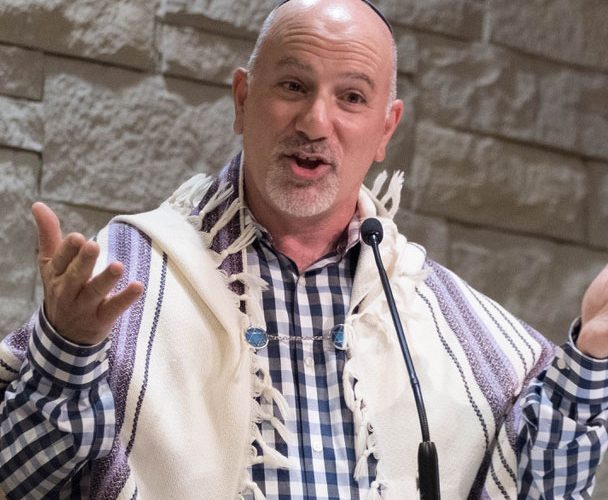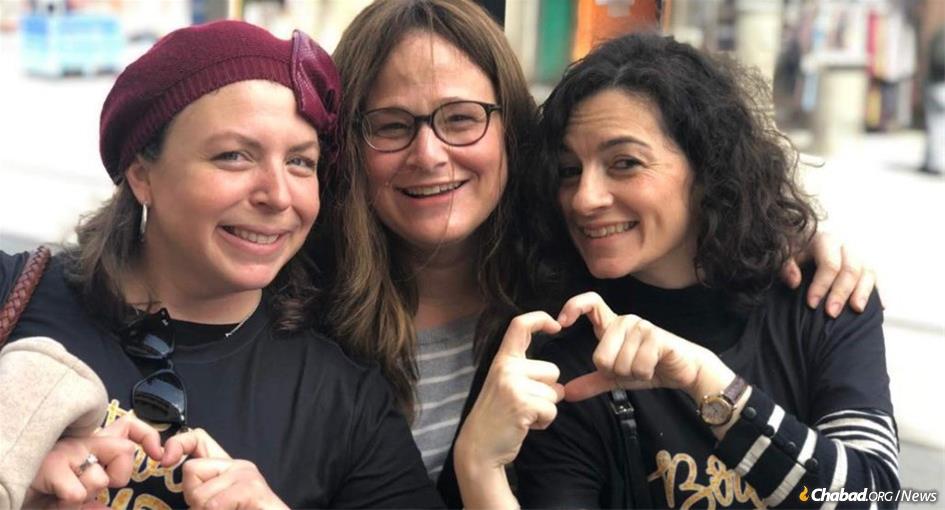Your Daily Phil: Crowdsourcing salary data in the Jewish community + All the masks we wear
Good Wednesday morning!
Hackers disrupted a career fair yesterday at the virtual Israel Summit, Aidan Golub, its executive director, told eJewishPhilanthropy. Members of Students for Justice in Palestine and the U.S. Palestinian Community Network organized to infiltrate the discussion and charge that Israel is “a stolen land.” Most of the content for the summit, a 5-day event created by and for university students and featuring such speakers as Sen. Mitt Romney (R-UT), was pre-recorded. “It is inevitable that those who seek to delegitimize Israel will see such a loving, peaceful and successful event as antithetical to their goals,” Golub said.
The Chronicle of Philanthropy published its annual list of the United States’ 50 biggest donors to charity, which in 2020 reflected a more intense interest by donors in grassroots groups, especially those led by people of color, such as food pantries and historically black colleges and universities. Michael Bloomberg came third in the ranking after contributing $1.6 billion to the arts, public health and other causes.
Benjamin Soskis, a historian of Jewish philanthropy, chimed into an online debate when he tweeted an article about Indivisible. The progressive network that disappointed the hopes of both big donors and grassroots activists by becoming a national advocacy organization instead of empowering local leaders, according to the authors. The article shows how a group that defined itself against the “nonprofit industrial complex” became that very thing, Soskis wrote.
Andres Spokoiny, president of the Jewish Funders Network, said that all groups structured this way — with a central hub and chapters — experience these tensions. “Umbrella groups will be allowed to have as much control as the value they give to chapters,” he told eJewishPhilanthropy. “And then there’s the question of what’s the best way to advance your mission? In some moments, you need everybody to form a straight line. In some moments, you need a local approach. Both are needed. The friction between them will never cease.”
WITH THE BAND
A new project urges Jewish groups to be more open about salary


COURTESY RABBI REBECCA SIRBU
The baristas were the inspiration. Two Jewish professionals, who had long thought they and their colleagues would benefit from more information about compensation in their field, noticed that important conversations about salaries were already happening — among the staff of independent coffee shops. Rabbi Rebecca Sirbu and consultant Sara Shapiro-Plevan were intrigued by the workers’ efforts to crowd-source salary data online to help them negotiate their wages. The women decided to try a similar effort under the name of the Gender Equity in Hiring Project, which they had created in 2018. eJewishPhilanthropy’s Helen Chernikoff talked with them about how the project has grown, and its unexpected impact.
Talent pipeline: “We thought, ‘What is the risk involved in throwing up a spreadsheet?’” said Shapiro-Plevan. Nearly 700 people employed in various Jewish organizations anonymously entered their salary, job title and experience level and geographic area. Later this week, Shapiro-Plevan and Sirbu will host a Zoom event for the project’s supporters to discuss the findings and what they want to do next. “We need to be taking care of folks who occupy the middle and lower tiers of organizational hierarchies,” Shapiro-Plevan said. “They’re the pipeline to leadership, and unless we take care of them they will exit the Jewish community.”
Pay gap: The Gender Equity in Hiring Project has raised awareness of a practice — including salary ranges in job listings — that is already widely recommended among management experts, said Gali Cooks, CEO of Leading Edge, a provider of consulting and training services to Jewish nonprofits. The organization published a report in 2018 documenting gender disparities in pay across the Jewish world. It found that men are 30% of the communal workforce but 70% of its leaders, and male-led organizations have an average budget size three times that of organizations led by women.
OP_ED
After 11 deaths in 11 days, I had it out with God


Courtesy
Following the deaths of 11 congregants to COVID-19 or coronavirus-connected, Rabbi Paul Kipnes knew the time had come to speak with God. He shares the conversation.
The lead-up: After 11 deaths in 11 days, I had it out with God. I realized it was time for that conversation with the Creator, the One I had been putting off. Between widespread sadness, the busyness being rabbi to the rapidly rising number of really sad situations, and my growing anger at El Shaddai, the Most High, Supposed Healer of all, I knew I couldn’t put it off any longer.
Calendar invite: So I made an appointment with the All Knowing Almighty to illuminate the inner struggle in my soul. Wanting to give the Blessed One the benefit of the doubt, and because I prefer to kvell and not kvetch, I set out to start slowly, sharing my sadness.But right away, my release poured out as rage.
The resolution: It was time to stand on my own two feet, to wipe away the tears, and to partner once more with the Transcendent Teacher of Torah. I carefully wrapped my Tallit around our Maker’s metaphoric shoulders, and pulling HaEil Hagadol Hagibur v’Hanora (the Great, Awesome, Wondrous One) closer to me – right here (pointing to heart) and right here (pointing to head) — I promised to stand up, speak out, and stop being cowed by apologists for falseness.
Op-ED
All the masks we wear


Shutterstock
With Purim just around the corner, bringing with it the one-year anniversary of the pandemic, Dr. Betsy Stone writes about the holiday of masks.
One-year anniversary: So we are back at the holiday of masks, masks that allow us to cover and hide who we really are. COVID-19 has both illuminated and weakened our masks. I increasingly understand what parts of me I put on for other people and what parts of me are just for me. My fears, my insecurities, my strengths, my inner doubts have risen to the surface, no longer covered by the masks of social interactions and the way I present myself to others. I spend more time with my feelings and ideas, because there’s more space in my life for my feelings — good and bad.
What matters: If we look to our central characteristics, what strengths have we found during this awful time? Under our masks and the trappings of community, who are we left with? What parts of COVID do we want to keep? I know that teaching has been my raison d’etre, whether with clergy, camp staff, or parents, with professionals or congregants. It has kept me sane, made me feel useful. Zoom has been a lifeline. The wounds of friendships sidelined have taught me who matters and to whom I matter. I have become more aware of the fences I erect around myself, the ways I protect myself from harm. My marriage has deepened, reminding me that trauma may produce growth.
Worthy Reads
Stock Appreciation: Thanks to a Toronto lawyer, a family in San Diego family has learned that more than a century ago an ancestor, Sadie Weiss, purchased five shares of stock in a bank intended to fund the creation of the state of Israel. The lawyer, David Matlow, who likes to purchase, research and return Zionist artifacts, bought the stock certificate at auction and returned it to Marty Weiss, Sadie’s grandson, who plans to cherish it as a keepsake. [SanDiegoUnionTribune]
Music Business: The Songs of Love Foundation, which creates music for teens facing medical or mental health challenges, has created a “Billy Bitcoin” superhero icon to encourage supporters to give in cryptocurrency. It started accepting donations in bitcoin in 2013. [CoinDesk]
Supremes Ruling: The highest court in the land has again defended religious liberty against state overreach, striking down California’s prohibition on indoor worship, writes the editorial board. It also warns Gov. Gavin Newsom that his singing ban might be on the docket soon. [NationalReview]
Rock Star: Yonat Shimron remembers Hershel Shanks, who died Feb. 5 at age 90. A lawyer who discovered a love of archeology on a trip in Israel and then devoted himself to making the field accessible to laypeople, Shanks was the founder of the Biblical Archaeology Reviewand a “rabble rouser” scorned by academics who didn’t like his articles for mainstream readers. He also published and edited Moment magazine from 1987 to 2004. [RNS]
Virtuous Cycle: The Leap of Reason Ambassadors Community, a network of leaders, practitioners, funders and policymakers in the nonprofit sector, has issued a report containing essays by professionals at the Ford and Hewlett foundations about how trust from funders builds a positive, productive relationship with grantees.[LeapAmbassadors]
Community Comms
Register for Leading Edge’s Employee Experience Survey: Registration ends on February 24!
Apply! Want to join the team at Jewish Insider/eJewish Philanthropy? We’re looking for a top-notch philanthropy editor at eJP. Learn more here.
Be featured: Email us to inform the eJP readership of your upcoming event, job opening, or other communication.
Word on the Street
The Jewish Agency has appointed Pnina Agenyahu director of Partnership Together… The Israel Cancer Research Fund has appointed Beryl Chernov national executive director, effective July 1, 2021… K-12 funding juggernaut the Walton Family Foundation has released a new strategic plan… The London Beth Din has issued guidance on marking Purim during the pandemic… JGirls Magazineis accepting applications for 2021-2022 teen editor and staff photographer positions… the Center for Advanced Judaic Studies at the University of Pennsylvania has launched a lecture series exploring race and religion… The Jews of Color Initiative in partnership with the Rodan Family Foundation have announced new grants in the East Bay…
Pic of the Day


Chabad.org/News
Chaya Chitrik, center, co-director Chabad of Istanbul, is this Sunday’s keynote speaker at the International Conference of Chabad-Lubavitch Woman Emissaries.
Birthdays


YouTube
Israeli singer, songwriter and dancer, Jonathan Ya’akov Mergui
European Rabbi who has served in Vienna, Munich and now Berlin, Yitshak Ehrenberg … Executive chairman of the Walt Disney Company, Bob Iger … CEO Emerita of DC-based Jewish Women International, Loribeth Weinstein … Ethiopian-born, former member of Knesset for the Likud party (2015-2019), Avraham Neguise … Journalist and syndicated newspaper columnist, Jeff Jacoby… Former NASA astronaut, famous for his mezuzah in the International Space Station, Garrett Reisman … Associate director of development at the Midwest regional office of the Anti-Defamation League, Matthew Feldman … Columbus-based executive director of Ohio Jewish Communities, Howie Beigelman …
Israeli pop star and part of the duo “TYP” also known as The Young Professionals, Ivri Lider … Co-founder and principal at Klein/Johnson Group, Israel “Izzy” Klein … Israeli rock musician, Dudu Tassa … Entrepreneur and digital media strategist, Mindy Finn … Director of marketing and communications at Greens Farms Academy, Michelle Levi Noe … Counsel in the Washington, DC office of Venable, Ariel S. Wolf … Global operations specialist and project manager at Mixtiles in Israel, Avital Mannis …








